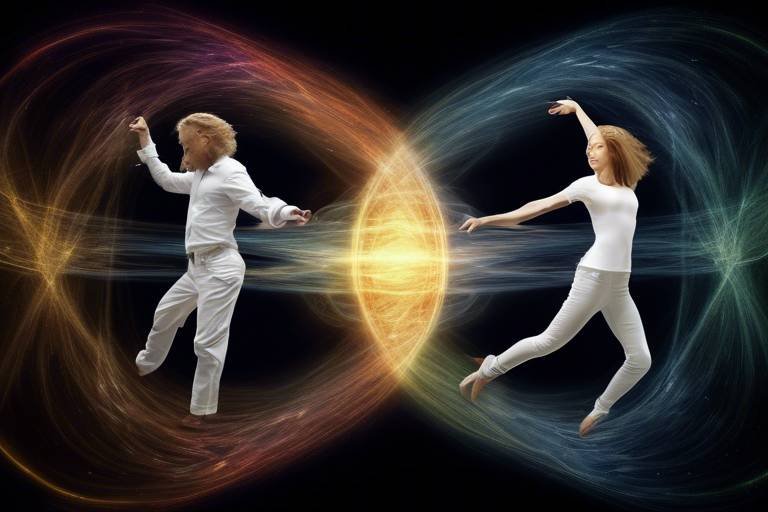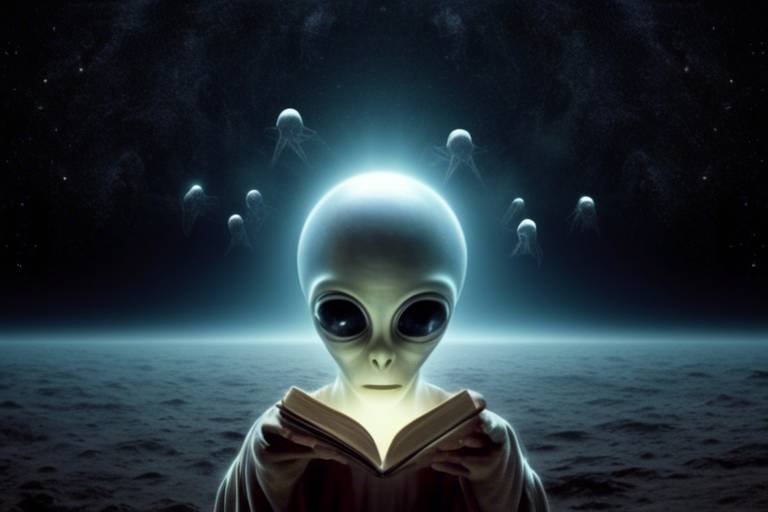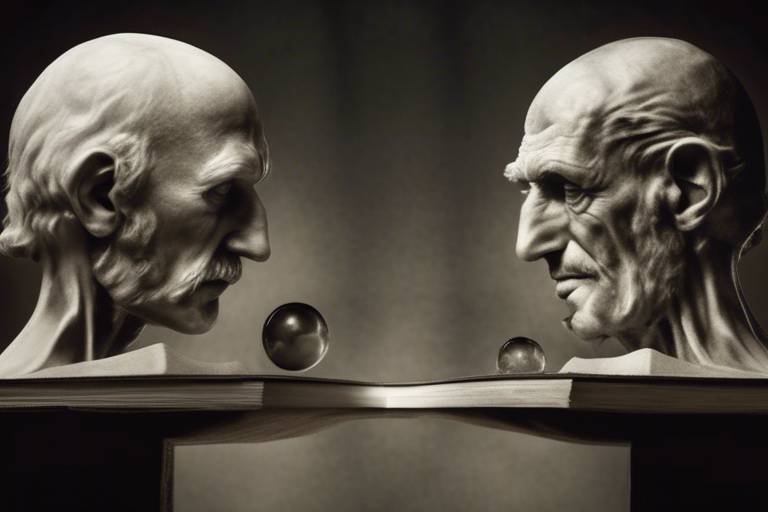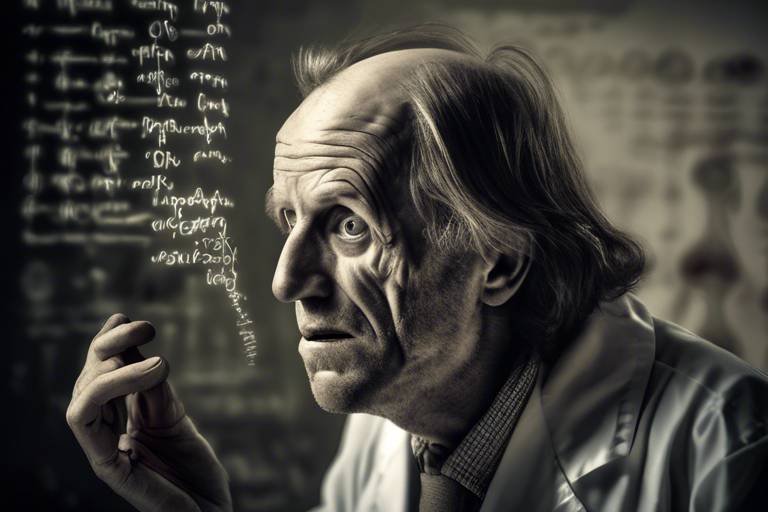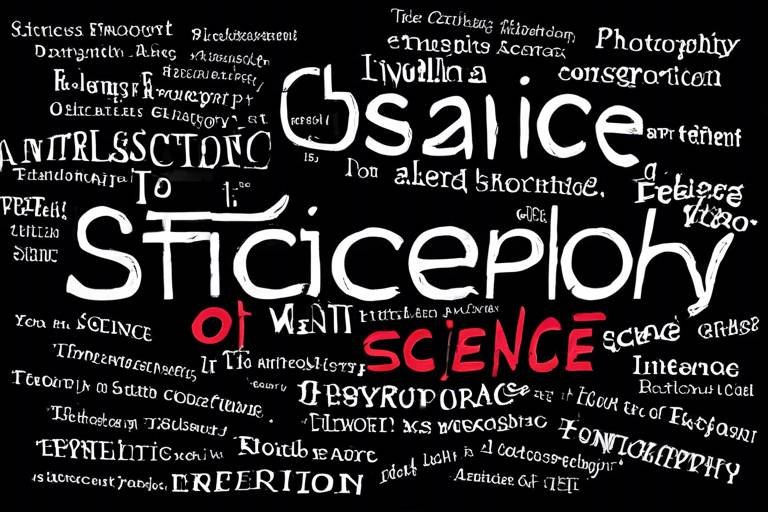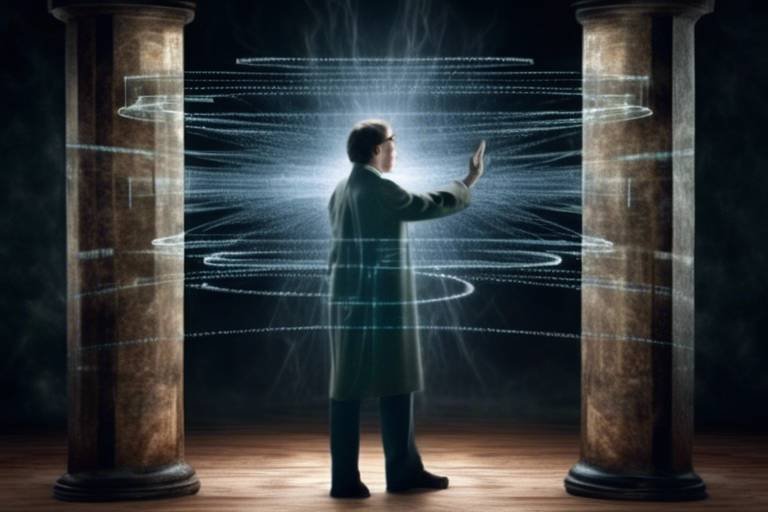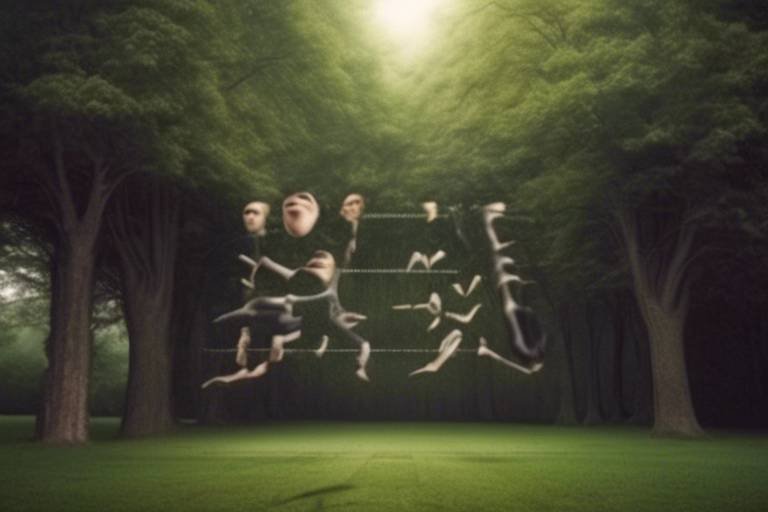The Primordial Soup Theory - The Philosophical Foundations
The Primordial Soup Theory is not just a scientific hypothesis; it's a profound exploration into the very essence of life and our existence. Imagine a time when the Earth was a chaotic mix of chemicals, a bubbling cauldron of potential where life was born from the simplest of organic compounds. This theory suggests that life originated in a nutrient-rich "soup" of organic molecules, setting the stage for the complex tapestry of life we see today. But what does this mean for us? It raises questions that go beyond the laboratory and into the realm of philosophy, challenging our understanding of existence, consciousness, and the very nature of life itself. As we delve deeper into this theory, we find ourselves confronted with fundamental inquiries: What does it mean to be alive? How did consciousness arise from non-living matter? And, perhaps most intriguingly, what is our place in this vast universe?
These questions are not merely academic; they resonate with our daily lives and influence how we perceive our existence. The implications of the Primordial Soup Theory stretch into various fields, from biology to cosmology, and even ethics. It invites us to consider the interconnectedness of all life and the possibility that we are all part of a grand, cosmic narrative. As we explore these philosophical foundations, we begin to understand that the origins of life are not only a scientific inquiry but also a profound journey into the depths of our own consciousness and existence.
In essence, the Primordial Soup Theory serves as a metaphor for our own evolution as thinkers and beings. Just as the early Earth was a crucible for life, our minds are a melting pot of ideas, experiences, and beliefs. This theory encourages us to embrace the unknown, to explore the depths of our curiosity, and to seek understanding in the chaos of existence. It reminds us that the quest for knowledge is not just about finding answers but also about appreciating the journey itself.
- What is the Primordial Soup Theory? - It is a scientific hypothesis that suggests life began in a nutrient-rich environment filled with organic compounds.
- What are the philosophical implications of this theory? - It raises questions about existence, consciousness, and our place in the universe.
- How does this theory relate to modern science? - It influences various fields, including biology, cosmology, and ethics.
- What are some alternatives to the Primordial Soup Theory? - Alternatives include the Deep-Sea Hydrothermal Vents model and the Panspermia hypothesis.

[Historical Context]
The journey to understanding the origins of life on Earth is as fascinating as it is complex. The **Primordial Soup Theory** emerged in the early 20th century, a time when scientists were beginning to grapple with the mysteries of biological beginnings. Before this theory took shape, various hypotheses about life's origins were proposed, often steeped in **mythology** and **philosophy** rather than empirical evidence. The concept of a primordial soup—a mixture of organic compounds in a watery environment—gained traction as scientists sought to explain how simple molecules could evolve into the complex forms of life we see today.
In the 1920s, Russian biochemist Alexander Oparin and British scientist J.B.S. Haldane independently developed ideas that would later form the backbone of the Primordial Soup Theory. They suggested that the early Earth was a **reducing environment**, rich in methane, ammonia, and other gases, which could react in the presence of energy sources such as lightning or ultraviolet radiation. This theory laid the groundwork for future experiments aimed at simulating early Earth conditions and testing the viability of life's spontaneous generation.
Fast forward to the 1950s, when the scientific community witnessed a pivotal moment: the **Miller-Urey experiment**. This groundbreaking experiment simulated the conditions of early Earth by combining water, methane, ammonia, and hydrogen in a closed system, then applying electrical sparks to mimic lightning. The results were astounding—after a week, the experiment produced several amino acids, the building blocks of proteins. This experiment not only provided empirical support for the Primordial Soup Theory but also ignited a flurry of research into the origins of life.
As the decades progressed, the theory evolved, influenced by advancements in **biochemistry** and **molecular biology**. Scientists began to explore the possibility that life could arise from simple organic compounds through a series of chemical reactions facilitated by environmental conditions. However, it’s essential to recognize that the Primordial Soup Theory was not without its critics. Some scientists argued that the conditions on early Earth might not have been as conducive to life as initially thought, leading to the exploration of alternative theories.
To summarize the historical context of the Primordial Soup Theory, we can look at the following key milestones:
| Year | Event | Key Contributors |
|---|---|---|
| 1920s | Development of the primordial soup concept | Alexander Oparin, J.B.S. Haldane |
| 1953 | Miller-Urey experiment | Stanley Miller, Harold Urey |
| 1960s-1970s | Advancements in biochemistry and molecular biology | Various scientists |
In conclusion, the historical context of the Primordial Soup Theory is rich with scientific inquiry and philosophical exploration. It serves as a reminder of how human curiosity and the quest for knowledge can lead us to profound insights about our existence. As we delve deeper into the origins of life, we must remain open to new ideas and perspectives that challenge our understanding, ensuring that the conversation about life's beginnings continues to evolve.

[Key Philosophical Questions]
The Primordial Soup Theory isn't just a scientific hypothesis; it opens the door to a treasure trove of philosophical inquiries that challenge our understanding of existence itself. Have you ever paused to think about what it truly means to be alive? This theory, which suggests that life began in a warm, nutrient-rich environment, raises profound questions about the nature of life, consciousness, and our place in the universe. One might wonder, how did simple organic compounds evolve into complex life forms? What does it mean for something to be 'alive'? These questions are not just academic; they dive deep into the essence of our being and existence.
At the heart of these inquiries lies the question of consciousness. If life originated from a primordial soup, how do we account for the emergence of consciousness? Is consciousness merely a byproduct of biological complexity, or is it something more profound? This leads us to consider the relationship between mind and matter. Are we simply biological machines, or do we possess an essence that transcends our physical forms? Such questions invite us to ponder the very fabric of reality and our role within it.
Moreover, the theory prompts us to reflect on the concept of existence itself. In a universe that may be teeming with life, what does it mean to exist? Are we unique, or just one of many forms of life scattered across the cosmos? This curiosity can lead to a deep sense of connection with the universe, as we consider the possibility that life is not just a rare phenomenon but a common occurrence throughout the galaxies.
Furthermore, the implications of this theory extend to our understanding of ethics and morality. If life emerged from simple chemical processes, does that diminish the value of existence? Or does it enhance our appreciation for the intricate tapestry of life? These questions challenge us to rethink our moral frameworks and how we view our responsibilities toward other forms of life, both on Earth and beyond.
As we delve deeper into these philosophical questions, we find that they are intertwined with the scientific exploration of life's origins. The intersection of philosophy and science serves as a rich ground for inquiry, prompting us to ask not only how life began but also why it matters. The Primordial Soup Theory, therefore, is not just a scientific narrative; it is a philosophical journey that invites us to explore the depths of our existence and the universe.
- What is the Primordial Soup Theory? The Primordial Soup Theory posits that life began in a warm, nutrient-rich environment where simple organic compounds evolved into more complex forms.
- How does the theory relate to consciousness? The theory raises questions about the emergence of consciousness and whether it is a byproduct of biological complexity or something more profound.
- What are the ethical implications of this theory? It challenges us to reconsider our moral frameworks and responsibilities toward life, both on Earth and in the cosmos.
- Can we find life elsewhere in the universe? The theory opens up the possibility that life is not unique to Earth, suggesting that it may be common throughout the universe.

[Scientific Contributions]
The Primordial Soup Theory has been shaped and enriched by the contributions of numerous scientists over the years. Each of these pioneers has brought a unique perspective, adding depth and complexity to our understanding of how life might have originated on Earth. The journey of this theory is akin to a grand tapestry, where each thread represents a different strand of research, weaving together to create a more coherent picture of life's beginnings. Among these contributions, the most notable figures include Stanley Miller and Harold Urey, whose groundbreaking experiment in the 1950s provided a pivotal moment in the theory's validation.
The Miller-Urey experiment is often heralded as a cornerstone of the Primordial Soup Theory. Conducted in 1953, this experiment simulated the conditions of early Earth by combining water, methane, ammonia, and hydrogen in a closed environment. By applying electrical sparks to this mixture, Miller and Urey demonstrated that organic compounds, such as amino acids, could form spontaneously. This finding was revolutionary; it suggested that the building blocks of life could arise from simple chemical reactions in a primordial environment. The implications were profound, sparking further inquiries into the conditions necessary for life to emerge.
Beyond Miller and Urey, many other scientists have contributed to the dialogue surrounding the Primordial Soup Theory. For instance, researchers like Alexander Oparin and
As science has progressed, the Primordial Soup Theory has not remained static. New technologies and discoveries have allowed scientists to explore the early Earth in unprecedented detail. For example, advances in mass spectrometry and genomic sequencing have enabled researchers to analyze ancient rocks and even the genetic material of extremophiles—organisms that thrive in harsh environments. These studies have broadened our understanding of the conditions that could have fostered life. Additionally, the exploration of extraterrestrial environments, such as Mars and the icy moons of Jupiter and Saturn, has prompted scientists to consider how similar processes might occur elsewhere in the universe.
In summary, the scientific contributions to the Primordial Soup Theory are vast and varied, each adding a new layer to our understanding of life's origins. From the seminal experiments of Miller and Urey to the ongoing explorations of modern scientists, this theory continues to evolve. It challenges us to ponder not just how life began on Earth, but also the potential for life to exist in other corners of the cosmos. As we delve deeper into this topic, we find ourselves at the intersection of biology, chemistry, and philosophy, each discipline illuminating different facets of this profound question.
- What is the Primordial Soup Theory? The Primordial Soup Theory posits that life originated from a mixture of organic compounds in the early Earth's oceans.
- Who conducted the Miller-Urey experiment? The Miller-Urey experiment was conducted by Stanley Miller and Harold Urey in 1953.
- What did the Miller-Urey experiment prove? It demonstrated that organic compounds, such as amino acids, could form under conditions thought to resemble those of early Earth.
- Are there alternative theories to the Primordial Soup Theory? Yes, alternatives include the Deep-Sea Hydrothermal Vents theory and the Panspermia hypothesis.
- How does the Primordial Soup Theory impact modern science? It influences various fields, including biology, cosmology, and the search for extraterrestrial life.

[Miller-Urey Experiment]
The Miller-Urey Experiment, conducted in 1953 by Stanley Miller and Harold Urey, stands as a pivotal moment in our quest to understand the origins of life on Earth. Imagine a time when the world was a very different place—no bustling cities, no towering skyscrapers, just a primordial landscape filled with water, gases, and the energy of lightning. This experiment sought to recreate those conditions in a laboratory setting, aiming to demonstrate how simple organic compounds could form from inorganic materials, thus providing a glimpse into the potential pathways that led to the emergence of life.
In their groundbreaking experiment, Miller and Urey used a closed system that simulated the early Earth's atmosphere, which they believed to be rich in methane, ammonia, hydrogen, and water vapor. By applying electric sparks to this mixture, they mimicked the lightning strikes that may have occurred in the primordial environment. The results were nothing short of astonishing: after just a week, the experiment yielded a variety of organic compounds, including amino acids, the building blocks of proteins. This was a moment of triumph, suggesting that life's fundamental components could arise from the simplest of ingredients under the right conditions.
To better understand the significance of the Miller-Urey experiment, let's break down its key components:
| Component | Description |
|---|---|
| Atmospheric Gases | Methane, ammonia, hydrogen, and water vapor were used to simulate early Earth conditions. |
| Energy Source | Electric sparks were utilized to replicate lightning strikes, providing energy for chemical reactions. |
| Organic Compounds Produced | Amino acids and other organic molecules were formed, indicating potential pathways for life's origins. |
This experiment not only bolstered the Primordial Soup Theory but also ignited further research into abiogenesis—the process by which life arises naturally from non-living matter. It opened the door to a new understanding of how life could emerge from the chaos of the universe. However, while the results were promising, they also raised questions about the complexity of life. Could such simple compounds truly lead to the intricate forms of life we see today?
As scientists delved deeper into the implications of the Miller-Urey experiment, they began to realize that the path from amino acids to living organisms is anything but straightforward. The experiment demonstrated that the building blocks of life could form under specific conditions, but the transition from these basic components to fully functioning cells remains a mystery. It's like having all the ingredients for a cake but not knowing how to bake it—what's missing in the recipe for life?
In conclusion, the Miller-Urey Experiment was not just a scientific endeavor; it was a bold step into the unknown, challenging our understanding of existence and the origins of life. It laid the groundwork for future explorations into life's beginnings and continues to inspire new generations of scientists. As we ponder the implications of their findings, we are reminded that the quest for understanding our origins is as much a philosophical journey as it is a scientific one.
Stay tuned as we explore more about the philosophical foundations of the Primordial Soup Theory and its implications for modern science!
- What was the main goal of the Miller-Urey experiment? The main goal was to simulate early Earth conditions to see if organic compounds could form from inorganic materials.
- What were the key findings of the experiment? The experiment produced amino acids and other organic compounds, suggesting possible pathways for the origins of life.
- How does the Miller-Urey experiment relate to the Primordial Soup Theory? The experiment provided experimental support for the idea that life could arise from simple organic compounds formed in a primordial environment.
- Are there any criticisms of the Miller-Urey experiment? Yes, some scientists argue that the conditions used in the experiment may not accurately reflect those of early Earth.

[Modern Adaptations]
The Primordial Soup Theory, once a cornerstone of our understanding of life's origins, has undergone significant transformations as scientific knowledge expands. In the contemporary landscape of astrobiology and synthetic biology, researchers are not just revisiting the old ideas; they are refining and adapting them to incorporate new discoveries that challenge the traditional narrative. Think of it as a classic recipe that chefs have modernized by adding unexpected ingredients while still honoring the original flavors. This adaptation process is essential for keeping the theory relevant in light of advancements in technology and scientific inquiry.
One of the most intriguing modern adaptations involves the integration of findings from molecular biology and genetics. Scientists are now exploring how complex organic molecules could have formed not just in the primordial soup, but also in environments that were previously overlooked. For instance, research into the role of clay minerals has suggested that these natural catalysts could have played a critical role in the formation of the first organic compounds. Imagine clay as a natural kitchen where the ingredients of life were mixed and cooked under the right conditions, leading to the emergence of complex biological systems.
Moreover, the advent of advanced simulation technologies, such as computer modeling and artificial intelligence, has enabled researchers to recreate early Earth conditions with unprecedented accuracy. These simulations allow scientists to test various hypotheses about the chemical pathways that might have led to life. By virtually experimenting with different combinations of elements and environmental factors, researchers can visualize how life might have emerged from a chaotic mix of molecules. This modern approach is akin to using a high-tech laboratory to explore ancient mysteries.
Additionally, the exploration of extraterrestrial environments has opened up new avenues for understanding life's origins. Missions to Mars and the study of icy moons like Europa and Enceladus have sparked discussions about whether life could have originated in similar primordial conditions elsewhere in the universe. These findings suggest that the Primordial Soup Theory could be part of a larger narrative about life's emergence across the cosmos, implying that our understanding of life's beginnings is not confined to Earth alone.
In summary, the modern adaptations of the Primordial Soup Theory reflect a dynamic interplay between historical concepts and cutting-edge science. As researchers continue to uncover the mysteries of life's origins, they challenge traditional views while integrating new perspectives that enrich our understanding of existence itself. The journey from the primordial soup to the stars is not just a scientific endeavor; it’s a philosophical exploration that invites us to ponder our place in the universe.
- What is the Primordial Soup Theory? The Primordial Soup Theory suggests that life originated from a mixture of organic compounds in Earth's early oceans.
- How has the theory evolved over time? Modern adaptations have integrated new findings from molecular biology and space exploration, refining the original concepts.
- What role do extraterrestrial environments play in our understanding of life's origins? Research into other celestial bodies has led to the idea that similar primordial conditions may exist elsewhere, influencing theories about life's emergence.
- Are there alternative theories to the Primordial Soup Theory? Yes, theories such as the Deep-Sea Hydrothermal Vents model and the Panspermia hypothesis offer different perspectives on how life may have originated.

[Critiques and Alternatives]
The Primordial Soup Theory, while a fascinating concept in the study of life's origins, has faced its fair share of critiques and alternative theories that challenge its foundational premises. Critics argue that the theory, which suggests that life originated from a mixture of organic compounds in a primordial environment, lacks sufficient empirical evidence and fails to account for the complexity of life as we know it. One of the main criticisms centers around the assumption of a reducing atmosphere on early Earth. Recent geological evidence suggests that the atmosphere may have been more oxidizing, which raises questions about the viability of organic compound formation as proposed by the theory.
Moreover, the theory does not adequately explain how these organic compounds transitioned into living organisms. This gap in understanding has led scientists to explore alternative models that offer different perspectives on the origins of life. For instance, one such alternative is the Deep-Sea Hydrothermal Vents hypothesis. This theory posits that life may have originated in the warm, mineral-rich waters of hydrothermal vents on the ocean floor. These environments provide a unique combination of heat, minerals, and energy sources that could facilitate the formation of complex organic molecules, potentially serving as a cradle for the first living organisms.
Another intriguing alternative is the Panspermia hypothesis, which suggests that life did not originate on Earth at all. Instead, it proposes that life—or the building blocks of life—may have been delivered to Earth via comets, meteorites, or even interstellar dust. This idea shifts the focus from the conditions on early Earth to the cosmic environment, suggesting that life could be more widespread in the universe than previously thought. The implications of this hypothesis are profound, as they challenge the very notion of what it means to be 'alive' and where life can exist.
In light of these critiques and alternatives, it is clear that the quest to understand the origins of life is far from over. The scientific community continues to explore various avenues, and each new discovery adds another layer of complexity to our understanding. The table below summarizes some key critiques and alternative theories:
| Critique/Alternative | Description |
|---|---|
| Reducing Atmosphere Assumption | Recent evidence suggests early Earth's atmosphere may have been oxidizing, challenging the premise of the Primordial Soup Theory. |
| Deep-Sea Hydrothermal Vents | Proposes that life originated in mineral-rich, energy-rich environments on the ocean floor. |
| Panspermia Hypothesis | Suggests that life may have originated elsewhere in the universe and was transported to Earth. |
These critiques and alternatives highlight the dynamic nature of scientific inquiry, where hypotheses are constantly being tested, refined, and sometimes replaced. As we continue to unravel the mysteries of life's origins, it becomes increasingly clear that understanding our beginnings is not just a question of biology, but also one of philosophy, cosmology, and even ethics.
- What is the Primordial Soup Theory? The Primordial Soup Theory suggests that life originated from a mixture of organic compounds in a primordial environment, such as the oceans of early Earth.
- What are the main critiques of the Primordial Soup Theory? Critics argue that the theory lacks empirical evidence and fails to explain how organic compounds transitioned into living organisms.
- What is the Deep-Sea Hydrothermal Vents hypothesis? This theory posits that life may have originated in warm, mineral-rich waters of hydrothermal vents on the ocean floor.
- What does the Panspermia hypothesis propose? The Panspermia hypothesis suggests that life may have originated elsewhere in the universe and been transported to Earth.

[Deep-Sea Hydrothermal Vents]
Deep-sea hydrothermal vents are fascinating ecosystems that challenge our understanding of life's origins. Imagine a world where life thrives in complete darkness, where the sun's rays never penetrate, and where temperatures soar to extremes. These vents, found along mid-ocean ridges, release superheated water rich in minerals and chemicals, creating a unique environment that some scientists believe could be the cradle of life on Earth. The discovery of these vents in the late 1970s revolutionized our perception of life's habitats, suggesting that life could exist in conditions previously thought to be inhospitable.
At these hydrothermal vents, the water can reach temperatures of over 400 degrees Celsius (752 degrees Fahrenheit), yet life flourishes. Organisms such as tube worms, giant clams, and various bacteria have adapted to these extreme conditions, relying on chemosynthesis rather than photosynthesis. This process allows them to convert the chemicals emitted by the vents into energy, showcasing a remarkable example of life adapting in ways we never thought possible. The presence of these unique life forms raises profound questions about the resilience of life and its ability to thrive in seemingly uninhabitable environments.
One of the most compelling aspects of deep-sea hydrothermal vents is their potential connection to the origins of life. Some researchers propose that the chemical reactions occurring at these vents could have provided the necessary building blocks for life. The combination of heat, pressure, and minerals creates a rich tapestry of chemical reactions that might have led to the formation of organic compounds. This theory suggests that rather than life emerging in shallow, sunlit waters, it could have originated in the depths of the ocean, where these vents serve as a nurturing womb for the first living organisms.
Moreover, the discovery of extremophiles—organisms that thrive in extreme conditions—has broadened our understanding of the possibilities for life beyond Earth. If life can exist in such hostile environments here on our planet, what does that mean for the search for extraterrestrial life? This line of inquiry has sparked interest in exploring other celestial bodies, such as Europa, one of Jupiter's moons, which is believed to have a subsurface ocean that could harbor similar hydrothermal vent systems.
To summarize, deep-sea hydrothermal vents are not just fascinating geological formations; they are potential hotspots for understanding the origins of life. They challenge traditional views encapsulated in the Primordial Soup Theory and open new avenues for research into how life might arise in diverse environments. As we continue to explore these mysterious depths, we may uncover answers to some of the most profound questions about our existence and the nature of life itself.
- What are hydrothermal vents? Hydrothermal vents are openings in the Earth's surface that emit heated water enriched with minerals, typically found on the ocean floor.
- How do organisms survive in these extreme conditions? Organisms at hydrothermal vents rely on chemosynthesis, using chemicals emitted from the vents to produce energy, rather than relying on sunlight.
- Could life exist on other planets similar to those found at hydrothermal vents? Yes, the discovery of extremophiles on Earth has led scientists to explore the possibility of life in extreme environments elsewhere, such as on Europa or Enceladus.
- What role do hydrothermal vents play in our understanding of life's origins? They provide insight into how life could have originated in extreme conditions, challenging the Primordial Soup Theory and suggesting alternative scenarios for the emergence of life.

[Panspermia Hypothesis]
The Panspermia Hypothesis presents a fascinating alternative to the traditional views encapsulated in the Primordial Soup Theory. At its core, this hypothesis suggests that life on Earth did not originate here but rather arrived from other parts of the universe. Imagine for a moment that Earth is just one stop on a cosmic highway, with seeds of life traveling from one celestial body to another, perhaps hitching a ride on comets or meteorites. This idea not only challenges our understanding of life's origins but also expands the scope of our search for existence beyond our planet.
One of the most compelling aspects of the Panspermia Hypothesis is its ability to explain the resilience of life forms. Microorganisms, such as bacteria, have been shown to survive extreme conditions, including the vacuum of space and intense radiation. This resilience raises intriguing questions: Could these hardy organisms have traveled across the cosmos, lying dormant until they found a hospitable environment? If so, what does that mean for our understanding of life's adaptability and the potential for life elsewhere in the universe?
There are several variations of the Panspermia Hypothesis, each proposing different mechanisms for how life might travel through space. Here are a few notable ones:
- Lithopanspermia: This variant suggests that life could survive inside rocks ejected from a planet’s surface, traveling through space until landing on another celestial body.
- Radiopanspermia: This theory posits that microscopic life forms could be propelled through space by radiation pressure from stars.
- Direct Panspermia: This idea suggests that advanced extraterrestrial civilizations might intentionally send life forms to other planets, including Earth.
While the Panspermia Hypothesis is captivating, it does not provide a definitive answer to the question of life's origins. Instead, it shifts the focus from Earth-centric explanations to a broader, more universal perspective. This shift prompts scientists and philosophers alike to consider the implications of life existing elsewhere in the universe. If life can travel between planets, what does that say about our place in the cosmos? Are we part of a larger, interconnected web of life that spans the universe?
In conclusion, the Panspermia Hypothesis challenges us to rethink our assumptions about life's origins. It opens up new avenues for exploration, not only in astrobiology but also in the realms of philosophy and ethics. If life is indeed a cosmic phenomenon, then the implications for understanding existence, consciousness, and our responsibilities as stewards of life on Earth become profound. As we continue to explore the universe, the questions raised by the Panspermia Hypothesis will undoubtedly shape our quest for knowledge and understanding.
- What is the Panspermia Hypothesis? The Panspermia Hypothesis suggests that life on Earth originated from microorganisms or biochemical compounds from outer space, rather than developing independently on our planet.
- How does Panspermia explain the origins of life? It proposes that life could have been transported to Earth on comets, meteorites, or through space dust, potentially surviving the journey through extreme conditions.
- Are there different types of Panspermia? Yes, there are several variations, including lithopanspermia, radiopanspermia, and direct panspermia, each proposing different mechanisms for how life might travel through space.
- Does Panspermia provide a definitive answer to life's origins? No, while it offers an intriguing perspective, it does not fully explain how life began; rather, it suggests that life might be more widespread in the universe.
- What are the implications of the Panspermia Hypothesis? It encourages us to consider the possibility of life beyond Earth and challenges our understanding of existence and our place in the universe.

[Implications for Modern Science]
The Primordial Soup Theory doesn't just sit in a dusty corner of biology; it has profound implications that ripple through various fields of modern science. Imagine standing at the edge of a vast ocean, looking out at the unknown. This theory serves as a powerful lens through which we can explore the origins of life, consciousness, and even the cosmos itself. It raises questions that are not just scientific but also philosophical, pushing us to ponder the very essence of existence.
One of the most intriguing implications of the Primordial Soup Theory is its impact on the field of cosmology. As we gaze into the night sky, we can't help but wonder: Are we alone in this universe? The theory suggests that if life originated from simple organic compounds in a primordial environment, then similar processes could be occurring on other planets. This opens up avenues for astrobiology, where scientists are on a quest to find life beyond Earth. The search for exoplanets in the habitable zone of distant stars is a direct consequence of this line of thinking.
Furthermore, the ethical dimensions of the Primordial Soup Theory cannot be overlooked. If life can emerge from simple chemical reactions, what does that say about our responsibilities towards other forms of life, whether they exist here on Earth or elsewhere in the universe? This theory challenges us to rethink our relationship with nature and the ethical implications of manipulating life at its most fundamental level. We are not just observers in this cosmic drama; we are participants, and our actions can have far-reaching consequences.
In addition to its philosophical and ethical implications, the Primordial Soup Theory has sparked a flurry of research in synthetic biology. Scientists are now experimenting with creating life from scratch, using the principles derived from the theory. This leads us to a fascinating intersection where biology meets technology, giving rise to innovations that could redefine what it means to be alive. Imagine a future where we can engineer organisms to perform tasks that benefit humanity, from cleaning up pollutants to producing renewable energy. The boundaries of life, as we know it, are expanding, and the Primordial Soup Theory is at the heart of this transformation.
To better understand the implications of the Primordial Soup Theory across various scientific disciplines, consider the following table:
| Field | Implications |
|---|---|
| Cosmology | Exploration of life beyond Earth and the conditions that may support it. |
| Ethics | Re-evaluating our responsibilities towards life and nature. |
| Synthetic Biology | Engineering life forms for beneficial purposes and understanding life's fundamental principles. |
| Astrobiology | Investigating the potential for life on other planets and the origins of life in the universe. |
In summary, the Primordial Soup Theory is not just a scientific hypothesis; it is a catalyst for interdisciplinary dialogue that spans biology, philosophy, ethics, and technology. It challenges us to think critically about our place in the universe and the nature of life itself. As we continue to explore these implications, we must remain open to new ideas and discoveries that could reshape our understanding of existence.
- What is the Primordial Soup Theory? The theory posits that life on Earth began in a "soup" of organic molecules, which eventually led to the formation of simple life forms.
- How does this theory relate to the search for extraterrestrial life? It suggests that if life can arise from simple compounds, similar processes could occur on other planets, prompting scientists to search for habitable conditions elsewhere.
- What are the ethical implications of this theory? The theory raises questions about our responsibilities towards other forms of life and the consequences of manipulating biological systems.
- How has the Primordial Soup Theory influenced modern science? It has led to advancements in synthetic biology, astrobiology, and has sparked philosophical discussions about the nature of life and existence.

[Future Research Directions]
The exploration of the Primordial Soup Theory is far from over, and as we step into the future, the potential for groundbreaking research is vast. Scientists are now equipped with advanced technologies and methodologies that were unimaginable just a few decades ago. This evolution opens up exciting avenues in fields such as synthetic biology and astrobiology. Imagine a world where we can recreate the conditions of early Earth in a lab setting, or even simulate extraterrestrial environments to understand how life could emerge elsewhere in the universe!
One of the most thrilling aspects of future research is the potential for synthetic biology. This field aims to design and construct new biological parts, devices, and systems. Researchers may use insights from the Primordial Soup Theory to engineer microorganisms that can mimic the earliest forms of life. By understanding the basic building blocks of life, we could potentially create life forms that thrive in environments previously thought to be uninhabitable. This could lead to innovations in biotechnology, environmental remediation, and even medicine.
In the realm of astrobiology, scientists are also making strides. The search for extraterrestrial life is no longer confined to the realms of science fiction. With missions to Mars and the exploration of icy moons like Europa and Enceladus, researchers are eager to find signs of life beyond our planet. The Primordial Soup Theory provides a framework for understanding how life could potentially arise in these alien environments. For instance, studies are being conducted to analyze the chemical compositions of these celestial bodies, looking for organic compounds that could hint at life’s existence.
Moreover, interdisciplinary collaborations are becoming increasingly important. By merging insights from chemistry, geology, and even philosophy, researchers can approach the question of life's origins from multiple angles. This holistic approach may lead to new hypotheses and experiments that challenge existing paradigms. For instance, researchers may investigate how environmental factors, such as volcanic activity or meteorite impacts, could have influenced the primordial soup, leading to the formation of complex organic molecules.
To better understand the trajectory of this research, consider the following table summarizing potential future research directions inspired by the Primordial Soup Theory:
| Research Area | Description | Potential Impact |
|---|---|---|
| Synthetic Biology | Creating life forms that replicate early Earth conditions. | Advancements in biotechnology and environmental solutions. |
| Astrobiology | Exploring extraterrestrial environments for signs of life. | Understanding the potential for life beyond Earth. |
| Interdisciplinary Studies | Merging insights from various scientific fields. | New hypotheses and innovative experiments. |
In conclusion, the future of research inspired by the Primordial Soup Theory is not just about understanding where we came from; it's about unlocking the mysteries of life itself. As we continue to ask profound questions and explore the universe, we may find that the answers lie in the very building blocks that formed the first living organisms. The journey is just beginning, and who knows what discoveries await us in the cosmic soup of possibilities!
- What is the Primordial Soup Theory?
The Primordial Soup Theory suggests that life on Earth began in a "soup" of organic molecules in water, catalyzed by environmental factors like lightning or volcanic activity. - How does synthetic biology relate to the Primordial Soup Theory?
Synthetic biology aims to create new forms of life that could mimic early life forms as proposed by the theory, potentially leading to innovations in various fields. - What role does astrobiology play in understanding life's origins?
Astrobiology explores the potential for life in other environments, using the principles of the Primordial Soup Theory to guide research on extraterrestrial conditions. - Are there alternatives to the Primordial Soup Theory?
Yes, alternatives like the Deep-Sea Hydrothermal Vents theory and the Panspermia hypothesis offer different perspectives on how life may have originated.
Frequently Asked Questions
- What is the Primordial Soup Theory?
The Primordial Soup Theory suggests that life on Earth began in a "soup" of organic molecules, formed under the right conditions in the planet's early environment. This theory posits that these molecules eventually combined to create more complex forms of life, laying the groundwork for all biological diversity we see today.
- Who proposed the Primordial Soup Theory?
The concept of the Primordial Soup Theory was popularized by scientists such as Alexander Oparin and J.B.S. Haldane in the 1920s. They theorized that the early Earth's atmosphere, combined with energy from sources like lightning and UV radiation, could lead to the formation of organic compounds essential for life.
- What was the significance of the Miller-Urey Experiment?
The Miller-Urey Experiment, conducted in 1953, simulated early Earth conditions and successfully produced amino acids, the building blocks of proteins. This groundbreaking experiment provided experimental evidence supporting the Primordial Soup Theory and demonstrated that organic molecules could form naturally under prebiotic conditions.
- What are the critiques of the Primordial Soup Theory?
Critics argue that the Primordial Soup Theory oversimplifies the complex processes that led to the emergence of life. Some suggest that it fails to account for the specific environmental conditions required for life to begin, while others point to alternative theories such as the Deep-Sea Hydrothermal Vents and the Panspermia Hypothesis as more plausible explanations.
- What is the Deep-Sea Hydrothermal Vent theory?
This theory proposes that life may have originated in the nutrient-rich environments of deep-sea hydrothermal vents, where mineral-laden water provides the necessary energy and chemical building blocks for life. These extreme conditions could have fostered the formation of complex organic molecules in a way that differs from the traditional Primordial Soup model.
- What is the Panspermia Hypothesis?
The Panspermia Hypothesis suggests that life did not originate on Earth but was instead brought here from elsewhere in the universe, possibly via comets or meteorites. This idea challenges the Primordial Soup Theory by proposing that the building blocks of life may be widespread throughout the cosmos, rather than originating from Earth’s primordial conditions.
- How does the Primordial Soup Theory influence modern science?
The implications of the Primordial Soup Theory extend beyond biology, impacting fields such as cosmology and ethics. It shapes our understanding of life's place in the universe and influences ongoing research in areas like synthetic biology and astrobiology, where scientists seek to uncover the fundamental principles governing life's emergence and evolution.
- What are future research directions related to the Primordial Soup Theory?
Future research may focus on exploring synthetic biology to recreate the conditions that led to life’s emergence. Additionally, astrobiology will likely investigate the potential for life in extreme environments elsewhere in the universe, drawing inspiration from the concepts introduced by the Primordial Soup Theory.



